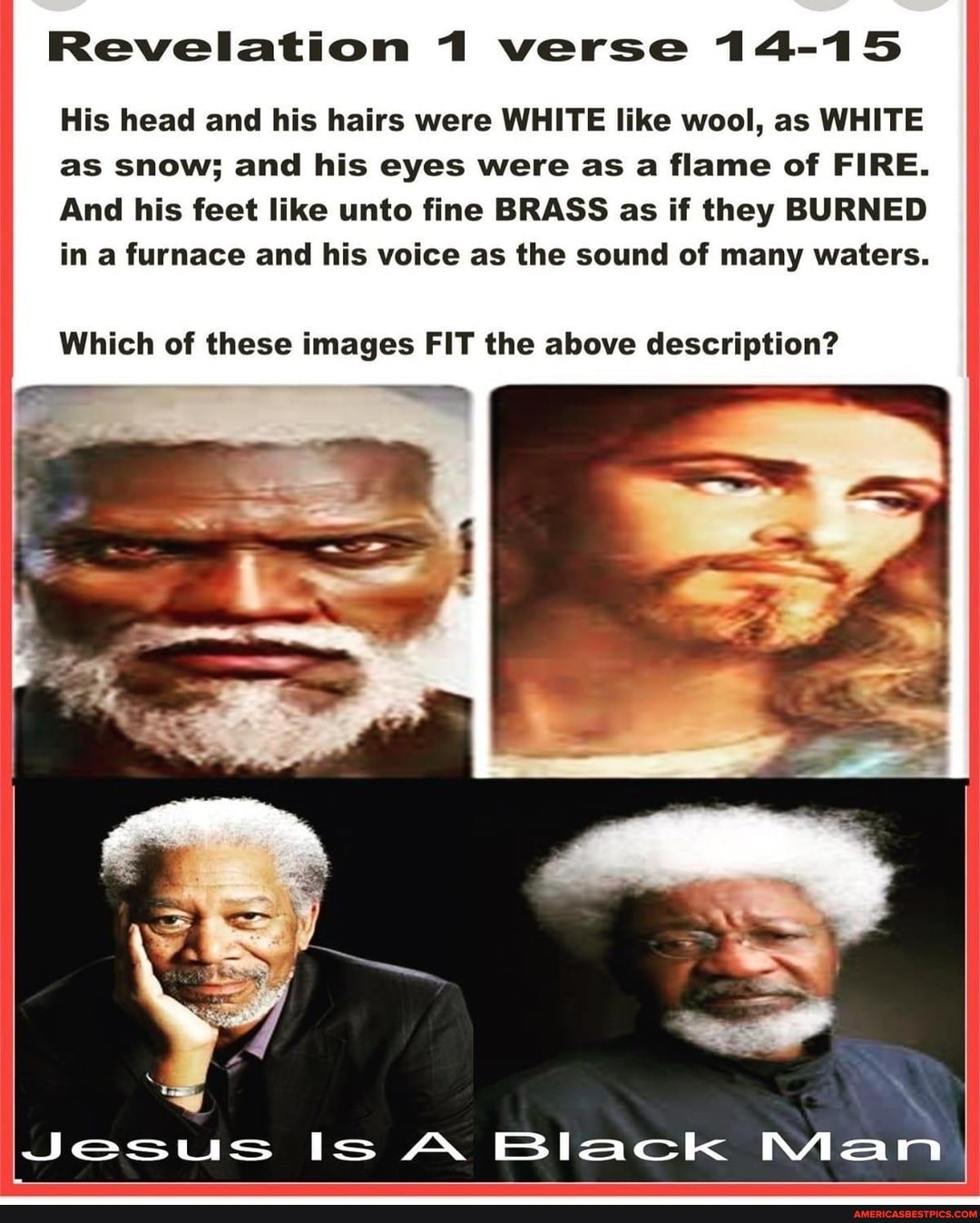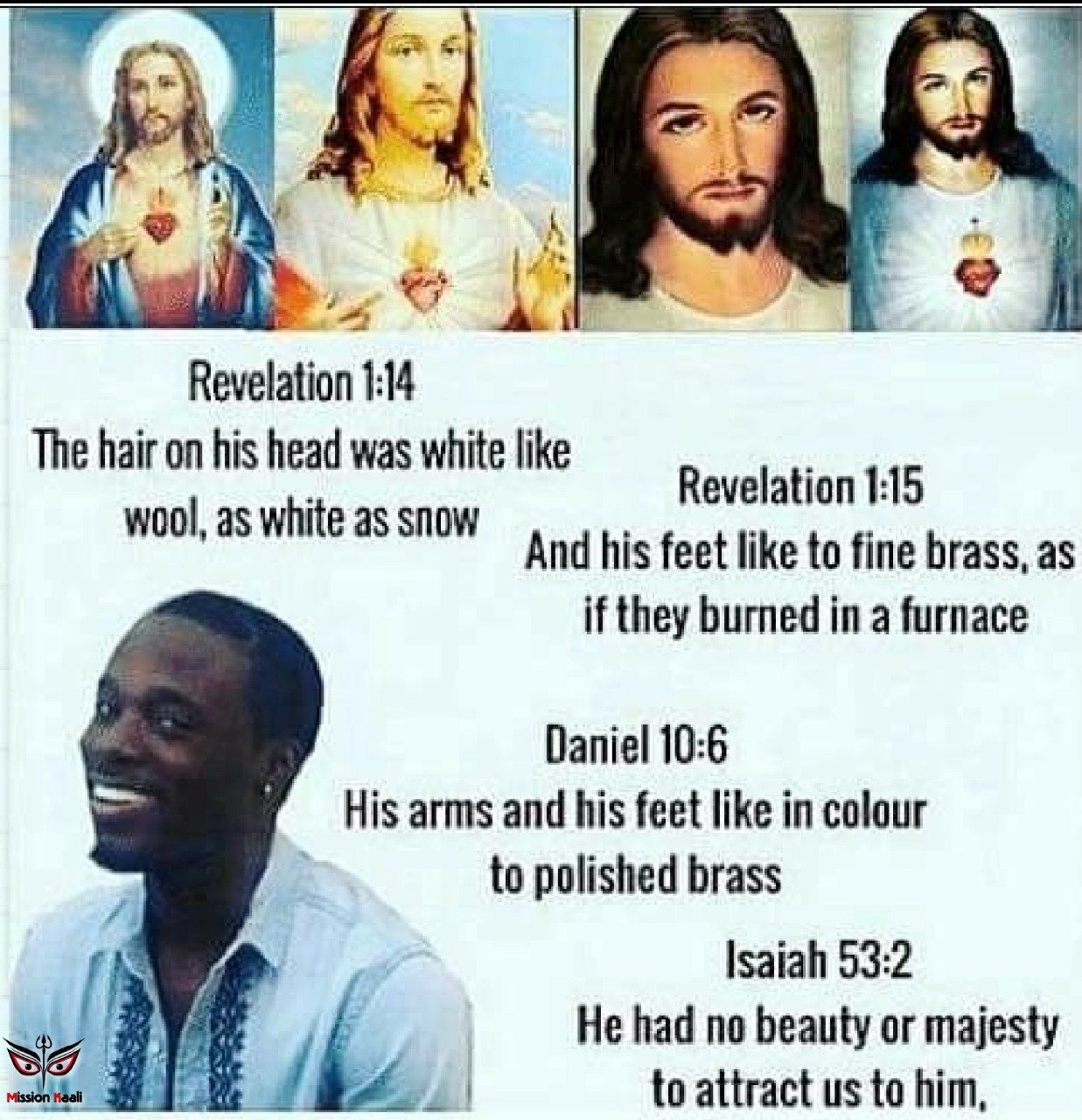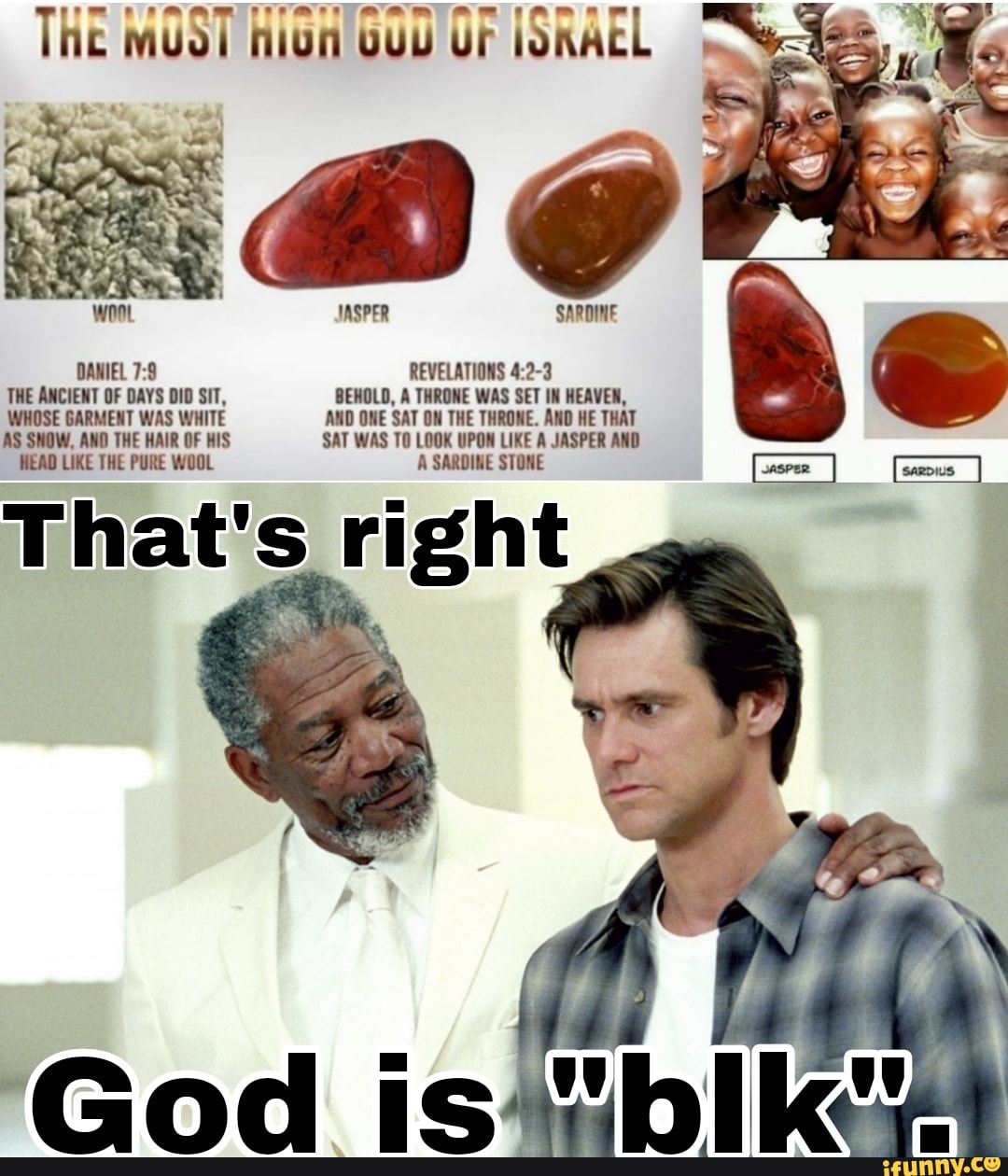![Revelation 1:14-15 [14]His head and his hairs were white like wool as white as snow; and his eyes were as a flam… | Black hebrew israelites, Revelation, Black jesus](https://i.pinimg.com/736x/a5/ff/4a/a5ff4ab4db48f35c08af1b953b0fe886.jpg)
14 His head and his hairs were white like
wool, as white as snow; and his eyes were as a flame of fire; 15 And
his feet like
unto fine brass, as if they burned in a furnace; and his voice as the
sound of many waters.(Revelations 1:14-15)

6 His body also was like the beryl, and
his face as the appearance of lightning, and his eyes as lamps of fire, and his arms and his feet
like in colour to polished brass, and the voice of his words like the voice
of a multitude.(Daniel 10:6)


14 His head and his hairs were white like
wool, as white as snow; and his eyes were as a flame of fire; 15 And
his feet like
unto fine brass, as if they burned in a furnace; and his voice as the
sound of many waters.(Revelations 1:14-15)

6 His body also was like the beryl, and
his face as the appearance of lightning, and his eyes as lamps of fire, and his arms and his feet
like in colour to polished brass, and the voice of his words like the voice
of a multitude.(Daniel 10:6)

First, it is important to remember that the Bible nowhere
gives a physical description of Jesus. The Bible does not say anything about Jesus’
height, weight, skin color, hair color, or eye color(https://www.gotquestions.org/was-Jesus-white.html).
Ye are of your father the devil, and the lusts of your
father ye will do. He was a murderer from the beginning, and abode not in the
truth, because there is no truth in him. When he speaketh a lie, he
speaketh of his own: for he is a liar, and the father of it.MUST READ:
GOD IS BLACK: THE VERSE ABOUT THE COLOR OF GOD THAT WHITE EDOMITES
DO NOT WANT YOU TO KNOW
https://watchmanafrica.blogspot.com/2025/02/god-is-black-verse-about-color-of-god.html
Africa Wake Up! You're God's Chosen People:
Bible & Real Jews
https://www.youtube.com/watch?v=v6QXTYNbmDw
The Bible is indeed black History: Bible verses that show that God
is black and Black people are the true biological Israelites: The white man and
the devil do not want you to Know these scriptures
https://watchmanafrica.blogspot.com/2024/05/the-bible-is-indeed-black-history-bible.html

History of the origin of the white race called Edomites
https://watchmanafrica.blogspot.com/2025/02/history-of-origin-of-white-race-called.html
… the Bible does mention black people, although the
Bible does not explicitly identify any person as being black-skinned.( https://www.gotquestions.org/black-people-Bible.html
)
My skin is black
upon me, and my bones are burned with heat.(Job
30:30)
There you go. Job was
Black
For the hurt of the daughter of my
people am I hurt; I am black; astonishment hath taken hold on me.(Jeremiah 8:21)
Judah mourneth, and the gates
thereof languish; they are black unto the
ground; and the cry of Jerusalem is gone up.(Jeremiah 14:2)
Our skin was black like an oven because of the terrible famine.(Lamentations
5:10)
Was Jesus black?
https://www.gotquestions.org/was-Jesus-black.html
There are some groups, usually affiliated with some form of the “Black Hebrew”
movement, who vehemently argue that Jesus was black/African in skin
color/appearance. While this goes directly against the fact that the
Bible declares Jesus’ Jewishness,
meaning He likely had light to dark brown skin, ultimately, the
discussion/argument misses the point. Does it really matter that we know
the color of Jesus’ skin—whether He was black, yellow, brown, or white?
Though this may be a controversial issue for some, the truth is that we
simply don’t know what the color of Jesus’ skin was. While there are
countless references to Jesus being Jewish as that was His heritage, the
Bible provides little, if any, description of what Jesus might have
looked like.
It is the prophet Isaiah who gives us the best description of the
physical appearance of Jesus: “He grew up before him like a tender
shoot, and like a root out of dry ground. He had no beauty or majesty to
attract us to him, nothing in his appearance that we should desire him”
(Isaiah 53:2).
If Jesus’ skin color and complexion were important, then God would have
told us about them. Furthermore, to presume that Jesus is of one color
or another is to speculate on information not found in Scripture. Such
conjecture is useless and can lead to unprofitable quarrels (1 Timothy 1:4; Titus 3:9). The point is that it does not matter in the whole scheme of redemption what color of skin Jesus had (Ephesians 1:7; Colossians 1:14).
So, what should we concern ourselves with when it comes to Jesus? Peter
tells us, “His divine power has given us everything we need for life and
godliness through our knowledge of him who called us by his own glory
and goodness” (2 Peter 1:3).
In other words, Christ has called us to a life of glory and moral
excellence, both here on this earth and in heaven. We are to live pure
and righteous lives for His glory. The message of this passage is clear:
it is His glory and goodness that attract man to seek life and
godliness in Him. It has absolutely nothing to do with the way He looks
or the color of His skin.
Peter also tells us that God “does not show favoritism but accepts men from every nation who fear him and do what is right” (Acts 10:34–35). When Jesus calls for us to go into all the world and teach the gospel (Matthew 28:18–20),
He is telling us that there are no cultural or racial barriers, that we
are all one in Christ Jesus. Paul echoes this in his letter to the
churches in Galatia: “There is neither Jew nor Greek, slave nor free,
male nor female, for you are all one in Christ Jesus” (Galatians 3:28).
The color of our Savior’s skin has no bearing on our sharing the
gospel. Nor should our neighbor’s skin color have any bearing on our
imparting the gospel message to him (Romans 1:16).
The apostles of the first-century church adapted to the cultures of the
foreign countries, but they never did so at the cost of their fidelity
to the law of Christ (1 Corinthians 9:19–23).
Paul may have changed his method of teaching whenever he entered a new
culture or foreign land, but he never changed his message. He kept
preaching the same things he had always taught, regardless of the color
of his listeners’ skin. What mattered was that they received the good
news of Christ. The truth is that the message of the gospel of Christ
worked then and the gospel still works today! It still reaches into the
hearts of those who yearn to know God, whether they are black, white,
yellow, or brown. It’s not the color of Jesus’ skin or the color of our
neighbor’s skin that matters in our eternal destiny. But what does is
that “salvation is found in no one else, for there is no other name
under heaven given to men by which we must be saved” (Acts 4:12).
Was
Jesus white?
https://www.gotquestions.org/was-Jesus-white.html
In much of Western art, Jesus is portrayed as having white
skin and light hair. Is that what Jesus really looked like? If not, why is He
so often portrayed that way?
First, it is important to remember that the Bible nowhere
gives a physical description of Jesus. The Bible does not say anything about
Jesus’ height, weight, skin color, hair color, or eye color. Such things are
not important to understanding who Jesus is. The closest the Bible comes to
describing what Jesus looked like is a non-detailed sketch of what Jesus was not
like in Isaiah 53:2: “He had no
form or majesty that we should look at him, and no beauty that we should desire
him” (ESV). Essentially, Isaiah 53:2 is saying that Jesus was
ordinary-looking. The description of the glorified Jesus having white hair and
bronze skin in Revelation 1:14–15 should
not be understood literally unless you also believe Jesus has seven stars in
his right hand, a sword in His mouth, and a face as bright as the sun (Revelation 1:16).
According to the Bible, Jesus was a Jew, a.k.a., a Hebrew or Israelite. Jesus
lived in the Middle East and was of Semitic descent. As a result, He very
likely would have had light- to medium-brown skin, brown eyes, and dark-brown
to black hair. While Middle Easterners occasionally have light skin, comparable
to that of Europeans, such skin tones are rare in that part of the world. Was
Jesus white? The answer is that He was very likely not white.
So, if Jesus likely was not white, why is He so often portrayed that way? If
you examine artists’ portrayals of Jesus from around the world, you find that
they often portray Jesus in a way similar to what people look like in that
particular culture. Europeans portray Jesus as a European. Africans paint Jesus
as an African. Asians illustrate Jesus in a way that makes Him look Asian.
People prefer to picture Jesus as looking somewhat like them, or at least like
people they are familiar with.
Is it wrong to do this? Not necessarily. As long as we do not allow our
preferred image of Jesus to become an idol, there is nothing in the Bible that
speaks against imagining Jesus looking a certain way. Jesus is the Savior for
“all nations” (Matthew 28:19; Galatians 3:8). No matter a person’s skin color,
race, ethnicity, or nationality, he or she can experience forgiveness of sin
and reconciliation with God through the crucified and risen Christ. The love of
Jesus transcends skin color. Having no physical description of Jesus, people
naturally imagine the Son of Man to be like themselves.
So, we should not be dogmatic in our preferred image of Jesus. The fact that
the Bible nowhere gives a physical description should serve as a caution
against arrogance and presumption on this subject. What Jesus looked like does
not really matter. His physical appearance has absolutely nothing to do with
His being the Savior of the world (John 3:16).

![Revelation 1:14-15 [14]His head and his hairs were white like wool as white as snow; and his eyes were as a flam… | Black hebrew israelites, Revelation, Black jesus](https://i.pinimg.com/736x/a5/ff/4a/a5ff4ab4db48f35c08af1b953b0fe886.jpg)



